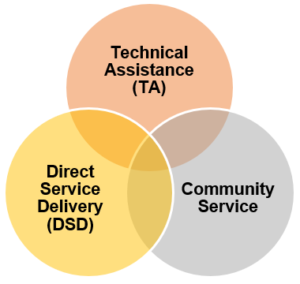The USAID TB LON-SAFT Programme was initially awarded to the Tuberculosis and HIV Investigative Network (THINK) to implement in the uMgungundlovu district of KwaZulu-Natal province from 1 October 2019 to 30 September 2020. The aim was to strengthen the drug-resistant tuberculosis (DR-TB) service delivery platform in the district.
An extension of this award followed to include drug-susceptible TB (DS-TB) as well for a period from 01 October 2020 until 30 September 2022 and the implementation area was expanded to also include uMkhanyakude, eThekwini in KwaZulu-Natal and three districts in the Eastern Cape province namely Nelson Mandela Bay Metro, Sarah Baartman and O.R. Tambo.

The objective is to close the gaps in the TB treatment cascade, which lead to only half of the estimated number of people with TB being successfully treated. The Programme seeks to close the gaps in the health care cascade by implementing activities responding to the five Intermediate Results (IRs):
- IR 1: Sustainability of effective TB response systems increased
- IR 2: Improved access to high-quality, person-centered TB, DR-TB, and TB/HIV service
- IR 3: TB service delivery platforms strengthened
- IR 4: TB disease transmission and progression reduced
- IR 5: TB research and innovations accelerated with improved impact on program implementation
The USAID TB LON-SAFT team’s service delivery model consists of Technical Assistance (TA), Direct Service Delivery (DSD) and Community Service to support the Department of Health (DoH) at National, Provincial and District levels to increase sustainability and effectiveness of TB response systems.
 TA is provided for activities such as data interpretation, infrastructure and management support, TB catch-up plans and COVID-19/TB integration, TB mortality audits, TB drug stock-out monitoring and support for pharmacovigilance, FAST (an infection control strategy for TB), Lateral flow urine lipoarabinomannan assay (LF-LAM) and TB Preventive Treatment (TPT).
TA is provided for activities such as data interpretation, infrastructure and management support, TB catch-up plans and COVID-19/TB integration, TB mortality audits, TB drug stock-out monitoring and support for pharmacovigilance, FAST (an infection control strategy for TB), Lateral flow urine lipoarabinomannan assay (LF-LAM) and TB Preventive Treatment (TPT).
DSD entails the targeted secondment of staff to facilities with a high TB burden to improve TB screening, linkage to care, tracing of patient that are lost to follow-up, treatment adherence, household contact management and data capturing.
The Community Service Delivery model comprises of capacity building for community-based structures such as Community- and Faith-based organisations, traditional healers and civil society to support TB service delivery as well as raising awareness and increasing knowledge about TB.
The USAID TB LON-SAFT Programme also supports South Africa’s recovery plan following the COVID-19 pandemic. Some of the key interventions implemented and supported include:
- Targeted Universal Testing for TB (TUTT) whereby that all adults and children presenting at health facilities will be tested for TB if they are living with HIV, a contact of a TB patient, have a history of TB in the past 2 years.
- Scale up of bi-directional screening and testing for TB and COVID-19
- Support implementation of DoH TB catch-up plans
- Digital chest X-ray to detect additional TB cases
- Scale-up of TB contact tracing
- Improve quality of TB data
- Improve linkage to care for people diagnosed with TB
Appreciation goes to USAID for supporting South Africa’s efforts to end TB through the implementation of the USAID TB LON-SAFT Programme. THINK is proudly implementing the Programme to make a difference and to help ensure that everyone has access to quality health care.
